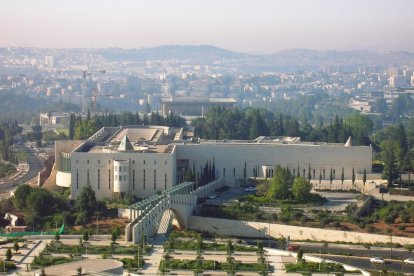Judicial reform "comes to improve" democracy in Israel
Following the massive protests against the measure, Argentine-Israeli writer Gustavo Perednik spoke to Voz Media to shed light on the matter and accused the left of not accepting the outcome of the elections and of wanting to rule through judges.

Supreme Court of Israel / Wikimedia Commons
The Argentine-Israeli writer Gustavo Perednik visited Buenos Aires to give a series of lectures on the tensions in Israel due to the controversy surrounding the judicial reform that the right-wing government led by Benjamin Netanyahu wants to carry out.
Opponents of the measure got together to protest against the ruling coalition, staging unprecedented protests in the Jewish state, in some cases involving violence. Those who reject the proposal often argue that "it is the end of democracy in Israel." Is this the case? Perednik spoke with Voz Media during his stay in Argentina before returning to the Jewish State, to help us understand what is happening in that country.
The writer responded to the opponents' arguments, indicating that the reform will not put an end to democracy. "It's the exact opposite," he said. He added that, in reality, it "comes to correct, to improve democracy" in the Jewish State.
Perednik explained that "Israel is the only country in the world where judges elect themselves. They have a veto in the appointment of judges, and have become a closed club that has generated a scandalous homogeneity."
The writer also took aim at the promoter of "this activist invasion of the other two powers," Aharon Barak, former president of Israel's Supreme Court. "He vetoes judges, not based on their training, but on their ideological affiliation," Perednik said. He added: "Out of 15 judges, 13 or 14 are all leftists, all very secularist, all live in the same area, they are all multimillionaires. It is a caste."
The writer stated that the members of the Supreme Court do not base their rulings on the law, but "on what they call the criterion of reasonableness, that is, judges in Israel rule on the basis of what seems reasonable to them." He quoted Justice Minister Yariv Levin who said that "we are in the arbitrary hands of the judges."
Perednik explained that Israel is the only country in the world where the opinion of legal counsel is not only advisory but binding. "What the advisor says, the government has to do and cannot defend itself before the court," he stressed.
"This has transformed Israel into a 'judicial democracy,' not a democracy. And this is what the reform comes to correct," the intellectual indicated. He added that "there is no area in which the Court does not intervene," even deposing ministers, the president of the parliament, vetoing his appointment, among other things. "Essentially, they govern the country," he said.
According to the writer, the tens of thousands of people protesting against the government's proposal "have no idea what the reform consists of."
Perednik stated that the chaos generated by the protests in Israel "has nothing to do with reform; the left does not accept having lost the elections," and indicated that this ideological current considers itself "the incarnation of truth and justice."
"The message of the left is no longer believed by anyone; nobody believes in socialism." He said that "no one believes that the Palestinian leadership wants peace with Israel," which is why "they will never win elections," and for this reason, he said, they rule through "judges and officials who have entrenched themselves in power."
Regarding the removal of Defense Minister Yoav Gallant, Perednik clarified that the decision was not made because the former official is opposed to reform, but because he called for its postponement in order to carry out "a general dialogue" on the matter. However, due to massive protests and heavy pressure, Netanyahu finally postponed the measure. The chaos generated by the left "had no limits," said Perednik. He added: "They blocked major roads for hours, threw stones at government ministers," and even "threatened on camera to kill the prime minister."
The writer criticized Gallant because "disobedience to the Army was generated" by some reservists, something that, he claimed "is unprecedented" in Israel's history. This situation is already dangerous for the existence of Israel, a country that could be wiped off the map by its enemies. In fact, Perednik said that a retired military pilot said that if the judicial reform goes through, "we will not take action against Iran," despite the danger posed to the Jewish state by the Iranian nuclear threat.
The writer also criticized the opportunism of opposition leader Yair Lapid, who "a few years ago was saying that reform is important in Israel," but "now he comes out to say that it is the end of democracy."
Perednik clarified that "Israel needs a very strong and very independent Supreme Court," but, he said, "the one we have now is omnipotent."
While he understands that protests will occur again as reform moves forward, Perednik stressed that "Israel has a number one priority today that it must resolve, and that can be summed up in three words: Iran, Iran and Iran." He concluded: "When we get rid of the threat of a nuclear bomb on Israel, which the ayatollahs proclaim everywhere, Netanyahu will be completely free to continue with the reform without threats that he will not be able to fulfill the basic defense of the State of Israel."
RECOMMENDATION





















